Since Beijing’s economic reforms began in 1978, Hong Kong has played a unique role — a place where western businesses could dip their toes in the new Chinese economy and where China’s Leninist system could engage with the modern, globalised economy, the FT reports.
but that’s about to change as Beijing imposes a strict new national security law with the result that the former UK colony could eventually lose the various economic and trading privileges it currently enjoys with the world’s largest economy.
Steve Tsang, director of the China Institute at Soas in London, predicts new protests and a harsh response over coming months as the national security law is “rammed through against the wishes of a very significant portion of the local population”.
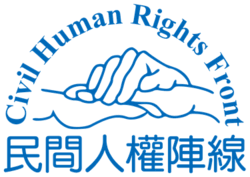 “For many people in Hong Kong such an act will be tantamount to ending the ‘one country, two systems’ model,” he adds. “We will now almost certainly see an upward spiral of protests and violence that will make the events of 2019 look restrained.”
“For many people in Hong Kong such an act will be tantamount to ending the ‘one country, two systems’ model,” he adds. “We will now almost certainly see an upward spiral of protests and violence that will make the events of 2019 look restrained.”
The conflict has emerged as a conflict of global norms, pitting illiberal autocracy against liberal democracy, observers suggest.
“[China is] afraid of Hong Kong people power. We must fight on,” Jimmy Lai, a former fashion entrepreneur who went on to establish the city’s largest pro-democracy newspaper, said in a series of tweets over the past week. “Hong Kong shares the universal values [of] freedom and democracy . . . it is the bridgehead for [a global] ideological battle.”
“The Chinese Communist party hates [US pressure] because they know it hurts them,” he told the FT. “If we lose our rule of law and freedom, we will have nothing left.”
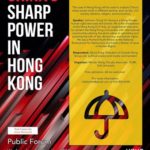 The UK has set itself on a collision course with China after broadening its offer on extended visa rights from 350,000 to almost 3m Hong Kong residents. After Beijing announced plans this week to proceed with the imposition of a national security law on Hong Kong, London retaliated with an “unprecedented” pledge to expand visa rights for British National (Overseas) passport holders in Hong Kong from six to 12 months and “provide a pathway to future citizenship”, The FT adds.
The UK has set itself on a collision course with China after broadening its offer on extended visa rights from 350,000 to almost 3m Hong Kong residents. After Beijing announced plans this week to proceed with the imposition of a national security law on Hong Kong, London retaliated with an “unprecedented” pledge to expand visa rights for British National (Overseas) passport holders in Hong Kong from six to 12 months and “provide a pathway to future citizenship”, The FT adds.
The threat of offering visa extensions and a path to potential citizenship would be “particularity worrying” for the Chinese government if large numbers of wealth creators connected to the business community decided they wanted to take up the offer and become resident in London, said Rana Mitter, director of Oxford University’s China Centre and author of A Bitter Revolution: China’s Struggle with the Modern World.
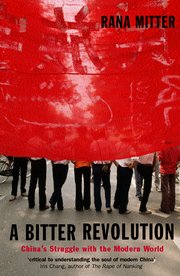 “That would be really problematic for the [Chinese] government”, he said. “It would be an international sign of lack of confidence in Hong Kong and harm its status as an international business centre.”
“That would be really problematic for the [Chinese] government”, he said. “It would be an international sign of lack of confidence in Hong Kong and harm its status as an international business centre.”
The Chinese government has mounted an aggressive campaign to cast a more positive light on its treatment of Hong Kong, where residents have pushed back sharply against Beijing’s increasingly heavy hand. The new drive is intended to demonstrate a broad level of support among civil servants, business leaders and the city’s more than seven million residents for a new national security law that Beijing is forcing the former British colony to adopt, The Times reports:
To counter that narrative, Mr. Xi, China’s most powerful leader in decades, is deploying the same political playbook in Hong Kong that he has used to consolidate his power in the mainland, using public displays of loyalty to project confidence at vulnerable moments. Chinese officials use such shows of allegiance — known as biao tai, or expressing one’s position — to uphold Mr. Xi’s decisions to sideline political opponents and to tighten control of the media.
 “They want this kind of well-orchestrated drama to present the picture that they have the people behind them, when clearly the majority of Hong Kong people are against the new law,” said Willy Lam, a political analyst at the Chinese University of Hong Kong. “The message to the opposition is: ‘We have already garnered the support of so many people, so it is futile to oppose it.’ ”
“They want this kind of well-orchestrated drama to present the picture that they have the people behind them, when clearly the majority of Hong Kong people are against the new law,” said Willy Lam, a political analyst at the Chinese University of Hong Kong. “The message to the opposition is: ‘We have already garnered the support of so many people, so it is futile to oppose it.’ ”
The prosperity of Hong Kong is based on its autonomy, not Beijing’s dictatorship, Demosisto’s Joshua Wong and digital rights activist Glacier Kwong write for TIME: Beijing’s decision will drive our city into dire straits in all aspects—the stock market may plunge, unemployment numbers may rise and foreign businesses may flee.
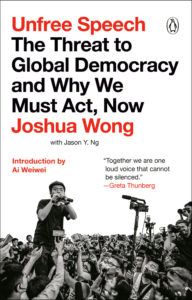 But at the same time we must acknowledge there is no room for a prosperous Hong Kong without adequate amount of freedom and human rights protection, add Kwong and Wong, the subject of the Netflix original, Joshua: Teenager vs Superpower (below), and author of Unfree Speech: The Threat to Global Democracy and Why We Must Act, Now.
But at the same time we must acknowledge there is no room for a prosperous Hong Kong without adequate amount of freedom and human rights protection, add Kwong and Wong, the subject of the Netflix original, Joshua: Teenager vs Superpower (below), and author of Unfree Speech: The Threat to Global Democracy and Why We Must Act, Now.
Hong Kong currently has its own police force and independent judicial system. China’s People’s Liberation Army keeps a garrison in Hong Kong, but it must abide by Hong Kong’s laws. That could all change if the new national security law is enacted, NPR’s Lisa Feing reports:
One of Beijing’s challenges will be to implement the new law within Hong Kong’s very different judicial system, which has decades of legal precedents establishing strong protections for civil liberties such as freedom of speech.
“Does that mean [Beijing is] going to have a branch of the Public Security Bureau or something in Hong Kong to try to enforce the law in Hong Kong?” asks the Wilson Center’s Michael C. Davis, a former Reagan-Fascell fellow at the National Endowment for Democracy (NED).
“The clashes are ideological. It’s Leninist authoritarianism versus liberal constitutionalism,” says Cora Chan, a law professor at the University of Hong Kong.
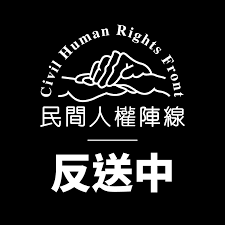 The US labor movement has awarded its prestigious George Meany Lane Kirkland Human Rights Award to the Civil and Human Rights Front of Hong Kong (CHRF).
The US labor movement has awarded its prestigious George Meany Lane Kirkland Human Rights Award to the Civil and Human Rights Front of Hong Kong (CHRF).
“The courage and perseverance displayed by the unions and allied organizations working together under the CHRF has sparked an increase in worker organizing and broad-based support for democracy even as they face significant opposition both inside and outside Hong Kong,” said AFL-CIO President Richard Trumka, calling on the authorities to drop charges against 15 democracy activists charged for participating in peaceful protests in 2019.
“As has been the case throughout history, the struggle for democracy relies on a robust labor movement and civil society and their ability to freely associate and assemble,” he added.
Dissident Chinese artist Ai Weiwei believes the national security law is “not lawful” because the Communist regime hasn’t even established “its own legitimacy of control,” but nevertheless augurs the end for the semi-autonomous city. Ai identifies with Hong Kong’s democracy movement and has been working on a documentary about protests that began a year ago, he told The Associated Press.
“I experienced every detail of who they (the protesters) are, how they fight and how this is going to end,” Ai said. “They are so determined and very pure. So those stories are really, really hurting me.”
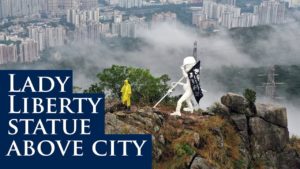
HK Lady Liberty/YouTube screen capture
The End Of Hong Kong As We Knew It,
Hong Kong officials and many in the business community have claimed for years that the city’s unique advantage lies in its rule of law and independent judiciary, which contrast starkly with the Communist party-controlled courts in the rest of China. But the new security law appears aimed at destroying those very advantages, The FT’s Jamil Anderlini adds:
Anyone who has paid attention to the rhetoric emanating from the Communist party will understand that the common law system and the separation of powers that exist in Hong Kong are precisely the problem in the eyes of Beijing. President Xi Jinping has said so himself.
 “Allowing the common law system to continue in Hong Kong is akin to asking foreign monks to recite local scripture,” as one party official puts it.
“Allowing the common law system to continue in Hong Kong is akin to asking foreign monks to recite local scripture,” as one party official puts it.
Beijing wants to keep the benefits it reaps from Hong Kong’s status as a free and independent place while taking away those very freedoms. This is our opportunity to make China understand it can’t do both, The Post’s Josh Rogin adds:
Hong Kong leaders are claiming business won’t be affected, but they have no real say anymore. Ultimately, the CCP is the party responsible for what happens in Hong Kong next, because it made the decision to throw the current system into disarray, for its own political purposes.
“One reason that they came to Hong Kong is because there was the rule of law there, there was a free-enterprise system, there was a capitalist system. There was democracy and local legislative elections,” national security adviser Robert C. O’Brien said on “Meet the Press” on Sunday. “If all those things go away, I’m not sure how the financial community can stay there.”
Working with China can’t be at the expense of our values or the rule of law, argues Guy Saint-Jacques, Canada’s ambassador to China from 2012 to 2016, and a fellow of the China Institute at the University of Alberta.







